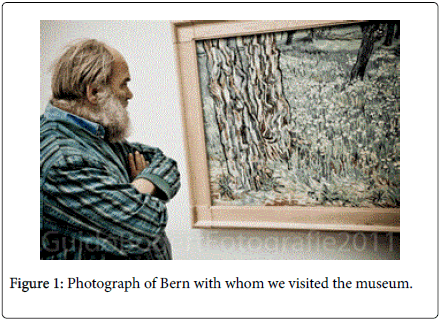Mini Review Open Access
Addressing Powers of Resilience by Photographs
Jan Sitvast*Department of Health Care, Hogeschool Utrecht, Heidelberglaan 7, Utrecht, 3584CS, Netherlands
- *Corresponding Author:
- Jan Sitvast, Ph.D
Lecturer, Department of Health Care
Hogeschool Utrecht, Heidelberglaan 7
Utrecht, 3584CS, Netherlands
Tel: 0031614328220
E-mail: jan.sitvast@hu.nl
Received date: November 15, 2016; Accepted date: January 07, 2017; Published date: January 14, 2017
Citation: Sitvast J (2017) Addressing Powers of Resilience by Photographs. J Comm Pub Health Nurs 3:153. doi:10.4172/2471-9846.1000153
Copyright: © 2017 Sitvast J, et al. This is an open-access article distributed under the terms of the Creative Commons Attribution License, which permits unrestricted use, distribution, and reproduction in any medium, provided the original author and source are credited
Visit for more related articles at Journal of Community & Public Health Nursing
Keywords
Health care; Patients; Photo
Introduction
We invited long stay patients in mental health care to share with us their journey into domains of their lives where they can experience a connection with ‘a valued life’ beyond illness and hospitalization. One of these journeys was literally travelling back to places where memories of the past can be remembered. How did we do this? The patient’s mentor nurse together with a photographer accompanied the patient on an excursion to particular places the patient said he/she would like to visit: A football game, his hometown of his childhood years, a beauty specialist, a concert. These excursions have become an exploration of patients’ roots, but also of dreams and ambitions: Who do you want to be as a person; how do you want others to see you and more basically how do you want to look like. These aspects that are closely related to resilience [1-4] and which have a great potential to be utilized for therapeutic ends, can be visualized by making photographs at crucial moments during the trajectory. A professional photographer, known with the principles of empowerment photography [4], photographed the patients. His photographs and meaningful text expressed by the patients themselves form together photo stories that in the end were returned to the patients. Also a photo exhibition is organized. The photo stories enabled patients to be recognized and accepted in positive and valuable aspects of their identity and history [5]. This reinforced their self-esteem and made them sensitive to their potential for change, growth and recovery (Figure 1) [5].
We have reported on this psychosocial intervention in a publication, titled: Recovery in Mental Health Care with the Aid of Photo-stories: An Action Research Based on the Principles of Hermeneutic Photography [6].
References
- Chisholm JS (2011) Flourishing, feelings, and fitness: An evolutionary perspective on health capability. In: Poiani A (eds.) Pragmatic Evolution: Application of Evolutionary Theory. Cambridge University Press, pp: 189-210.
- Huber M, Knottnerus JA, Green L, Van der Horst H, Jadad AR, et al. (2011) How should we define health? BMJ 343: d4163.
- Kashdan TB, McKnight PE (2009) Origins of Purpose in life: Refining our Understanding of a Life well Lived. Pschychological Topics 18: 303-316.
- Maailman S (2006) The loveliest girl in the world. Translated from Finnish: Ihanin Tyttö.
- Sitvast JE (2014) Hermeneutic Photography. An innovative intervention in psychiatric rehabilitation founded on concepts from Ricoeur. J Psy Nurs 5: 17-24.
- Sitvast J (2015) Recovery in Mental Health Care with the Aid of Photo-stories: An Action Research Based on the Principles of Hermeneutic Photography. Nursing and Health 3: 139-146.
Relevant Topics
- Chronic Disease Management
- Community Based Nursing
- Community Health Assessment
- Community Health Nursing Care
- Community Nursing
- Community Nursing Care
- Community Nursing Diagnosis
- Community Nursing Intervention
- Core Functions Of Public Health Nursing
- Epidemiology
- Epidemiology in community nursing
- Health education
- Health Equity
- Health Promotion
- History Of Public Health Nursing
- Nursing Public Health
- Public Health Nursing
- Risk Factors And Burnout And Public Health Nursing
- Risk Factors and Burnout and Public Health Nursing
Recommended Journals
- Epidemiology journal
- Global Journal of Nursing & Forensic Studies
- Global Nursing & Forensic Studies Journal
- global journal of nursing & forensic studies
- journal of community medicine& health education
- journal of community medicine& health education
- Palliative Care & Medicine journal
- journal of pregnancy and child health
Article Tools
Article Usage
- Total views: 2594
- [From(publication date):
February-2017 - Dec 20, 2024] - Breakdown by view type
- HTML page views : 1926
- PDF downloads : 668

